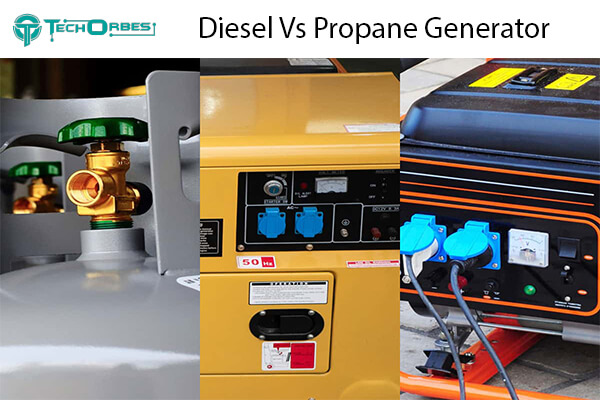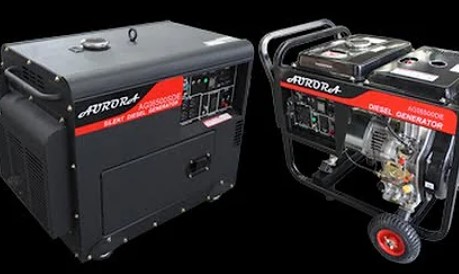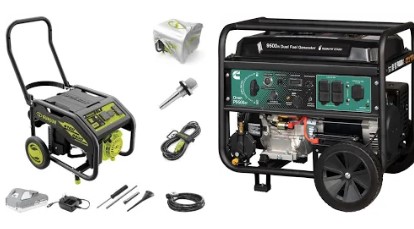Diesel Vs Propane Generator Comparison: Which One Is Better?
This article holds all information about Diesel Vs Propane Generator. How long can a company operate without electricity? A constant backup power supply is necessary to maintain the functionality of the lights, heaters, appliances, and machinery during a power loss.
Most firms can only afford to wait a few minutes before they begin to lose revenue and output. Additionally, homes require a dependable electricity backup source for sudden power disruptions and extended blackouts.
Electrical generators are available in various wattages and amperage output options for building sites, extensive industrial facilities, and smaller models for homes and recreational vehicles. Permanent or standby generators are situated close to the structure.
They will power on a covered concrete pad. Portable generators may be transported anywhere they are needed by fitting in the bed of a pickup truck. Which is better, propane or diesel, after determining your electricity requirements and generator size?
Table of Contents
Diesel Vs Propane Generator Comparison: Which One Is Better?
Because diesel has more BTUs per unit than propane, it will have a better efficiency rating. Although propane is less expensive, it generates less energy. Accessible in most places. External storage tanks are necessary.

Diesel Generator
Diesel backup generators are a standard option in cities or other places where diesel is easily accessible. Diesel generators provide a few benefits, whether portable or substantial standby models.
- Expensive running costs
- Plenty of fuel is available
- Fuel-efficient
- Less prone to start a fire
- Generators usually have a longer lifespan
A few drawbacks are there as well. In places with stringent environmental regulations or close to schools and hospitals, diesel generators might be a problem because they create more emissions than propane generators. To reduce emissions, DEF must be added to diesel engines.

Diesel exhaust fluid (DEF) is an additive that lowers the harmful gas emissions from diesel engines, such as carbon monoxide. Generators must have it, and you may anticipate DEF use to be around 10% of fuel consumption. See DEF FAQ to learn more about this additive.
That means keeping a tote-sized container and the fuel storage tank on hand for large standby generators. DEF is prone to freezing since it is 90% deionized water. Not to fear, we have DEF tote freeze protection as a solution in our guide. Diesel fuel requires the proper temperature and an extra component for maximum efficiency. In cold weather, diesel engines can be challenging to start, and their fuel might become gloppy. You should spend money on a tank heater to prevent problems in freezing weather.
Pros
- Compared to propane generators, diesel generators are more cost- and energy-effective. A diesel generator requires 1/3 the fuel for the same amount of electricity.
- Easy to maintain. Diesel generators require less maintenance since they are less likely to break down. They also live longer than average.
- Additional power. Unlike propane, diesel has a higher energy density, so burning the same amount of diesel produces more energy.
Cons
- Higher cost. Typically, diesel engines cost higher because of Tier 4 restrictions.
- Louder performance. Typically, diesel generators operate at a louder volume than propane generators.
- Finding fuel can be difficult. Diesel is more readily available than in the past, although it might be challenging to find during power outages because it is quickly purchased up.
Propane Generators
Generators powered by propane or LP gas are becoming more popular and may be preferable to gasoline-powered ones. This is why:
- Propane has an endless shelf life.
- Simple to access in an emergency
- Pollution-free combustion
- Carburetors are not required for generators.

There are a few issues with propane. To begin with, you should travel a significant distance to replenish portable tanks or plan the delivery of more extensive tanks for months. Diesel provides more energy than propane does. Diesel fuel produces almost 35 MJ/L, whereas propane produces 26 MJ/L. Although propane burns significantly more cleanly, an engine’s lifespan is often shorter.
Pros
- Easily accessible. Throughout the United States, propane is easily accessible at several home improvement and convenience stores. Even standard-sized propane tanks can be delivered to your residence or place of business in most places.
- It does not deteriorate while stored. Propane may be kept indefinitely in preparation for a power loss because it doesn’t degrade while in storage. It becomes a reasonable generator alternative for individuals who use their generators infrequently.
- Operation is quieter. Compared to diesel generators, propane generators operate significantly more quietly. They conveniently supply electricity without the clamor that backup generators produce.
Cons
- Less effective. Propane generators are less effective than diesel generators because they produce less energy per gallon of fuel due to propane’s poor energy density.
- A shorter lifespan. Propane generators require more maintenance than diesel generators and probably need to be replaced more frequently.
- It needs a tank for storage. Despite being one of the more affordable fuel choices, propane generators need an external storage tank and related piping, which can increase the entire cost.
Difference Between Diesel Vs Propane Generator
Fuel Price
According to the USA EIA, the country generates roughly 1.8 billion barrels of diesel per year compared to its 1.5 billion barrels of consumption. For propane, the situation is even better. The United States exports more propane as its housing production rises. As a result, both fuels are widely accessible in the USA. What about the cost, though?
Is propane more reliable in price than diesel? Diesel and propane prices fluctuate in very similar ways. Diesel and propane, which are generated using comparable techniques, endure the same price variations, as was described in this insightful comparison.
With only a slight decrease a few years ago, the cost of diesel has been steadily increasing over the past 15 years, going from $1 to $3 per gallon (for residential use). The EIA study demonstrates this point quite convincingly.
Does propane cost more than diesel? Similar to diesel, the price per gallon varies over the year. This does not imply that running a propane generator costs the same as running a diesel generator. Diesel costs about a third as much to purchase as propane. Diesel costs about $2.3 per gallon at retail, while propane costs between $2 and $2.8. (Considering domestic application). So, it stands to reason that propane.
Are propane generators, therefore, less expensive to operate than diesel generators? When the retail price and fuel energy density are considered, propane generators cost more than diesel generators. The cost of running a generator depends mostly on how much electricity can be generated from a particular volume of fuel rather than just the cost of fuel per unit of volume.
Consider buying a gallon of fuel (let’s call it fuel B) that costs half as much as another fuel, and we’ll name it to fuel A. This does not imply that running a generator with fuel A is less expensive. What if fuel A (the cheaper option) only produces 10% as much energy as fuel B? Consequently, even though fuel A is less expensive per volume, the energy produced with it will be significantly more expensive.
According to some further technical information, 1 gallon of diesel should be able to provide no more than 33kWh of energy. However, only 27kWh of energy may be generated from 1 gallon of propane. Therefore, based on the calculations, one gallon of propane will create energy that costs 8.8 cents per kWh ($2.4 divided by 27 kWh). On the other hand, diesel will cost 7.3 cents per kWh (achieved by dividing $2.4 by 33 kWh).
Be cautious, of course. Your electricity production costs per kWh with your generator will be far greater than the 7c I estimated above for both fuel kinds. This resulted from skipping the generator’s efficiency to simplify the technical examination. The generator may recover only 20% of the 33kWh of energy contained “within” a gallon of diesel.
Yes, 80% of the energy in your fuel is lost, despite how small it sounds. A 5 times higher price represents a more accurate estimate of what you will pay for each kWh of power (around 44c per kWh for propane and 36c per kWh for diesel). As a result, we can determine that using diesel generators is 22% less expensive.
Weight And Size
Diesel generators are generally a better option if space is a significant factor. These generators do have a gasoline tank built right into the generator. In contrast, propane generators do not have an integrated tank (as this will be pretty dangerous). The external propane tank must be connected to this sort of generator.
You will therefore have an additional cable with the propane tank, the generator, and the cables serving your devices. Something you don’t want, significantly if extremely few children or unauthorized individuals could accidentally gain access to the area where the generator is located (if you work on a field) (if in your garden).
But after looking at this generator, I wondered if its design affected its size or weight. Do propane and diesel generators have different weights? The weight of the generator is unaffected by the fuel type, particularly for portable generators. For instance, a 7000W-rated power generator (without the fuel tank) will still weigh about 200+ lbs., even running on propane or diesel.
If you glance around, you may also note that so-called “dual fuel” generators are becoming prevalent today (for instance, like the Pulsar on Amazon). Both gasoline and propane can be used to power these. This concrete example shows how little the engine differs between the two fuels.
In addition, a few dedicated YouTubers tried to convert a diesel (or gasoline) engine to run on propane (or natural gas). Although it is possible, I would not recommend it because it is difficult (also considering how expensive generators are nowadays in case you break yours). It was discovered that a portable generator’s size was unaffected by the fuel.
The size of a diesel and a propane generator did not differ noticeably to me (again, excluding the propane tank). For example, they both take up a volume of a cube about 23 inches square for an average 5000W rated power. What about the campers among you? I would stay away from propane generators in these. The tanks will significantly increase the load. Choose a compact diesel generator.
Fuel Availability
When selecting a generator, you should have this in mind. When purchasing a generator, you want to avoid getting bogged down in technical minutiae because you might be unable to utilize it later due to fuel shortage. First off, make sure to mix up propane with natural gas. They are different fuel types. This is significant because propane is not distributed via pipe networks, unlike natural gas.
This does not preclude it from traveling directly to your house, though. Compressed liquid propane (LCP) tanks are delivered to your doorstep in many nations, including the USA and the UK, and are prepared to be connected to your generator.
When the tank is empty, they might return to retrieve it when they bring a new one the following time. Additionally, some gas stations do have the option to refill your empty propane tank. Ask the next time you are standing in line to fuel your vehicle.
Diesel is different in this regard. Companies that I have yet to be aware of delivering diesel to homes. Therefore, in this situation, you must leave your home and go to the closest diesel station.
The advantage is that you can always get diesel because gas stations are open around-the-clock, as opposed to waiting a few hours or even days for a propane delivery or locating a station that can fill your propane tank (during working hours).
Diesel generators are, therefore, superior if fuel availability is one of your concerns due to how simple it is to fund such a fuel virtually everywhere, at any time. Propane is fine if you utilize an RV, though. Many household appliances, including refrigerators, already run on propane, so its lower availability (or more significant effort required to obtain it compared to diesel) is only sometimes a drawback.
Noise
As raucous as diesel generators are propane generators. The primary determinant of a generator’s noise level is not its fuel type. But there’s a catch. Portable diesel generators, according to many, are quieter. They are not lying, those individuals.
Their diesel generators are quieter because they are almost certainly inverter generators. These generators are a particular kind of diesel generator (and even use propane).
They have an additional unique mechanism (the inverter) that effectively enables them to run at the best speed (rather than the maximum) in case of a changeable load. Consequently, the inverter, not the fuel, makes them silent. Propane inverter generators are less popular than diesel ones and are equally as silent.
Decide to get an inverter generator if noise is a crucial concern. Diesel, gasoline, or propane are all acceptable options. Thus, the decision will be based on the other aspects covered in this essay. Of course, everything mentioned above may cover only some of the backup generators.
The subject of this conversation is portable generators (those on wheels that you can carry around). Large backup units permanently put in your garden may have more complicated (and expensive) engines, which can cause a difference in noise. According to a few of my friends’ installers, large backup diesel generators are noisier than their propane counterparts.
Conclusion
As a result, if you read through the discussion on Diesel Vs Propane Generator, you should know what is ideal for your circumstances (or at least have a better notion). Compared to diesel generators, propane is cleaner; the noise levels of portable propane and diesel generators are relatively similar.
Small portable diesel generators are substantially quieter than open-frame (non-inverter) propane generators, whether or not an inverter is used. Propane requires more space to store than diesel since it is less energy dense; this is not the cause of the problem.
In a relaxed setting, propane can be kept for ten years. Propane generators might be more appropriate for RVs because propane is currently used for other appliances within the RV. Diesel generators might require more maintenance than propane generators due to the high rate of diesel fuel degradation. Additionally, a generator for an RV will be positioned closer to the homes nearby.

Since childhood, I’ve been fascinated by computer technology, and have experimented with a variety of hardware and software. It was a dream come true to graduate from a renowned university with a degree in computer engineering, which made it possible for me to pursue my dreams swiftly.
